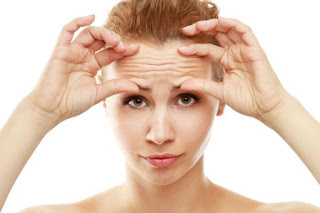
They say that age is nothing but a number. However, if we can literally count the years on your face through the wrinkles, you will definitely feel the weight of having plastered the number on your face. Wrinkles are the folds that develop on the skin as one ages. They are part of the natural aging process. As one ages, the skin's ability to produce elastin and collagen decreases. These two are important for maintaining the tightness and keeping away the wrinkles from the skin. Even though we cannot stop time, there are ways we can help the skin to slow down the formation of wrinkles. One of those ways is using the magic that is found in vitamins. Some vitamins are known to slow down the formation of wrinkles as discussed below:
1. Vitamin A
This is a very important vitamin for the skin. It helps to protect the body from harm by the oxidation of free radicals through its antioxidant properties. Topical solutions of the vitamin reduce the effects of sun damage and aging to the skin. It does this by acting as an exfoliator that reduces the fine lines and wrinkles. In fact, research conducted by the Food and Drug Association (FDA) shows that tretinion, a vitamin A topical solution, is the only prescription drug that repairs the skin from sun damage and reduces fines lines and large wrinkles. Stabilized over-the-counter topical solutions containing retinol can also have the same effect without too many side effects. Retinol is a natural form of vitamin A. Apart from topical applications, retinol is also found in liver, eggs, fatty fish or in supplements.
2. Vitamin C
This is another vitamin with antioxidant properties. It protects the skin from the free radicals that originate from digestion and exposure to pollution, cigarette smoke or radiation. In addition to that, it helps the body to produce other antioxidants such as vitamin E. Vitamin C also boosts the production of collagen which helps in giving the skin a firm and a youthful look. Topical applications of vitamin C also help to prevent sun damage to the skin. It also helps in relief from inflammatory skin conditions. Researchers state that of the vitamin Cs, the L-ascorbic acid is the best for preventing and offering relief from wrinkles. Sources of vitamin C include fruits and vegetables.
3. Vitamin E
Some call this vitamin "the protector". This is due to its ability to fight free radicals and protect the skin from damage by the sun's UVB rays. It also repairs dry, cracked skin when it is put on as a cream. Vitamin E is available from green leafy vegetables, nuts, seeds and vegetable oils such as canola, corn and soya beans.
4. Niacin
This is a vitamin that assists to keep you looking young and healthy both from the outside and from the inside. It is one of the B vitamins. It helps to keep the skin moist and supple by increasing its moisture retaining properties. Moist skin is an effective barrier against the ingress of antigens, bacteria and viruses hence warding off infections. The vitamin also helps in the regeneration of the skin by acting as an exfoliator. It sloughs off the dead skin cells as the new cells move to the surface. From the inside, niacin increases the level of good cholesterol while reducing the levels of triglycerides. This thus helps in preventing cholesterol-related problems in the body such as atherosclerosis. Sources of niacin include meat, eggs, poultry, nuts, fish and enriched breads among others.
5. Vitamin K
Dark circles around the eyes may not exactly be wrinkles but sometimes they look like rings of wrinkles around the windows of the soul. Thankfully, vitamin K is the solution for this menace. The dark circles are caused by many factors, one of the common ones being the pooling and clotting of blood around the eyes. The pooling and clotting is caused by capillaries that leak around the eyes. Vitamin K helps by constricting the capillaries and breaking up the clots. Dietary sources of vitamin K are kales, lettuce, spinach, none hydrogenated vegetable oils and broccoli. The body also produces the vitamin in small amounts.
Conclusion
Vitamins are very important in our bodies especially for the skin. Fighting the free radicals, which prevents the skin from untold harm, is a job thankfully done by almost all vitamins. The vitamins also all have their special functions that are important for keeping the skin young and supple. Research shows that vitamin A specifically deals with wrinkles by getting rid of them or preventing them either in its natural form or in topical applications. Vitamin K deals with the dark circles while vitamin E protects the skin from UVB rays among other numerous functions. All these are important in keeping the skin youthful and beautiful. Therefore, when you see that wrinkle cream review, confirm if they talked about any of these vitamins being part of the ingredients.
References:
https://www.thebeautyinsiders.com/how-to-repair-skin-wrinkles-with-natural-ingredients.html
https://www.solvaderm.com/blog/under-eye-fine-lines-and-wrinkles.html
Comments
Post a Comment